Folks, I hope you enjoy this episode with psychedelic fiction author Violet De Luna. My apologies for the sub-par audio quality. We had some technical/microphone/zoom issues and I’m working on improving this for next time.
Or, watch a video version with captions and visit my new Youtube channel. Or you can read the transcript below.
While the audio and video episode is unedited, the transcript is edited for readability.
The Spiritual Journeys of Violet De Luna
Charlotte Dune: Welcome to Charlotte Dune’s Lagoon. Today I’m talking with another author who’s also written a psychedelic novel and a love story. I invited Violet on because she wrote this amazing book, Walking Each Other Home, and I was reading it on an airplane and laughing and my daughter was like, what are you doing? But all the Miami stuff was really cracking me up.
Violet, tell us a bit about your background, about the book, and give people the general gist and then we’ll get into juicier topics, like how much of this is a true story and how much of this is made up…
Violet De Luna: Sure. I’m Violet. I’m from Miami, Florida, and I am sometimes a lawyer, but my real passion was to write a book and finally I wrote my first book, Walking Each Other Home.
It’s a story of a woman who attracts emotionally unavailable men. In order to open her heart, she decides to travel to Peru to drink a hallucinogenic called Ayahuasca. And once she’s there, she has her spiritual awakening, or so she thinks, in Peru and she decides that she will definitely find her partner.
When she gets back, she meets someone. His name is Leo, and she falls in love. But after a very shocking and difficult betrayal, Brooke realizes she has to overcome her lifelong feelings of inadequacy and shame to really love herself.
Charlotte Dune: I think all those things are so relatable to pretty much every woman because we’ve all been through betrayal, or had shame, or not felt adequate enough. It really resonated with me. I think it’s one of the most similar books I’ve ever read to my book, but you almost did it better. I’m just going to recommend your book instead of mine because there’s so much in your book!
How much was inspired by events in your life and where did the inspiration for the story come from?
Violet De Luna: The story is mostly based on my life, so, I’ve changed the names and used a pen name.
The Fine Line of AutoFiction
Charlotte Dune: There’s always a sensitive balance to maintain when you’re doing what I call autofiction, or work based on a true story. Are the characters in the book directly equivalent to real people, or did you make conglomerates of people? Did you make archetypes or how did you approach your characters? How did you approach the whole thing?
Violet De Luna: Because it was a story based on true events, I didn’t really have to outline so much because I knew what was going to happen. But I started off, and I just told the story, the, the correct way, with the names of everyone as they were. Then when I was doing my revisions, I changed details, changed story, order, and then changed all the characters’ names and some and I had to combine characters cause it gets confusing, you know, to separate everyone out. So, I combined characters, but the main character is based on me. I didn’t really change her story much, but everybody else, their information is altered in a way that I don’t think you could figure out who’s who.
Charlotte Dune: I was reading it and thinking, oh my gosh, are we in the same circles? Because I feel like I know some of these people in the constellation world. You universalized real people enough that they could become characters in anybody’s life, and that’s the beauty of fiction.
Did you also move to Miami from somewhere else, like your main character? And how did you begin your own spiritual journey?
Violet De Luna: I say I’m from Miami because I’ve lived here for so long, but I’m originally from Massachusetts, but I came here for law school, and I just loved it. It’s my place.
I’ve really been on a lifelong spiritual journey, I would say. I’ve always been trying to find my way home. I love that Ramdas quote, so that’s why I took it for the title of the book.
The Ceremony Will Find You
“Before plant medicine, my journey was very superficial. The plants forced me to go way deeper than I ever imagined I needed to go, as they often do.”
In the book, the focus is on plant medicine and how I found my way there. That is really the story. I was kite surfing in Colombia, and somebody mentioned this plant that can heal things. And I was like, oh, I wanna do that.
Then my friend from Colombia was she’s like, oh, I know what you’re talking about. We were at Family Constellations when I brought it up and we were both like, okay, we’re gonna go on a trip. I really did not read about it, which is shocking for me. I don’t know; I think I was just being protected because what would’ve happened if I had read about it first? Thankfully, I didn’t read about it. Haha.
That really changed the course of my journey so much. Before plant medicine, my journey was very superficial. The plants forced me to go way deeper than I ever imagined I needed to go, as they often do.
Charlotte: Yes! Though it sounds like you had quite an adventurous life before. You were kite surfing in Colombia. Are you somebody that’s always been drawn to adventure or spiritualism?
Violet: I was raised a Catholic, but it didn’t appeal to me, and my parents, they made me kind of do all the Catholic steps, but I wanted to get my reiki certification, so my mom went with me. She wasn’t into it, but she was fine. Then I went to undergrad in, in Boulder, Colorado. Everywhere I go, I find my people, or I look for how to learn about new methodologies.
I’ve been trying to find things that make me feel like ME, things that make sense. You can find it through meditation and other means, but when I took Ayahuasca for the first time, it was like, wow, that’s—that’s ME. I’ve been looking for that all along and I couldn’t find it.
That’s really what it comes down to. I’ve always been looking for that feeling of coming into myself.
Ayahuasca — The Grandmother Medicine
“I could feel it coming onto my brain… this beautiful white love, and at the same time, I was fighting it because there’s that moment where ayahuasca takes control and you have to let go.”
Charlotte: In the book, Brooke, the main character, goes to Peru several times for ayahuasca ceremonies.
Violet: Right. That’s all true, and the shaman in the book Diego Palma, he’s pretty well known, but he passed away. All the quotes in the book are his quotes that I got permission to use.
Charlotte: That’s so special, and sorry to hear of his passing. I didn’t personally get a chance to sit with him, so I’m glad that you’re bringing it to the world in the form of a book, so that people can have that chance without being able to, in a way.
Many folks who read my work or follow me are interested in doing ceremonies. How many ceremonies have you done and what’s your current relationship with—I call it grandmother Ayahuasca? I don’t know what you’d call it…?
Violet: Grandmother medicine. Yes, I have done 10 or more ceremonies. I can’t remember. I’ve lost count, but let’s say over 10, but maybe not more than 20, somewhere around there, but I haven’t done it in four years as my son is four, so not since he was born. I haven’t been called to do it recently.
I thought I was going to go back, but it didn’t work out and those three ceremonies in the book at the end, when the main character has the ceremony she’d been searching for, this huge spiritual awakening, when she sees all the things that people claim to see during a ceremony with connection to the universe and beautiful colors and lights—I had that. So now it’s like, oh, if I have to go back, I might have to do the work again… Haha. So, I haven’t been ready, but I’ve done other plants since then. I just haven’t sat with grandmother recently.
Charlotte: Do you feel like the grandmother medicine is a class of its own? Or what is your special plant? For me, I feel like Ayahuasca has a level of magic that doesn’t exist for me with other medicines or sacraments. But I know some people feel that relationship with San Pedro. Some people feel that relationship with psilocybin. Some people feel that relationship with LSD, or even marijuana. People even feel that relationship with sage or ginger.
Do you have a special plant relationship that’s more significant to you than others?
Violet: Well, the one I have the most reverence for is definitely Aya. I mean, I do just. You know, and, and my doula, she’s also a shaman, and she was offering me ayahuasca when I was in labor, and I was like, no, no I can’t do it. But a lot of women do. I took peyote, but she said to me, you know, every time I take Aya, I feel fear because you don’t know what’s gonna happen, and that’s my feeling with Aya as well. It’s a reverence, and it’s a fear. It is the strongest medicine I’ve ever experienced.
That being said, if I want to have a magical love field experience, I would say that San Pedro is that, cause it’s so much more kind, my experience at least. Even if it can be hard, it’s gentler.
Charlotte: I found Sam Pedro to be very hard on my stomach. Not in the same way Ayahuasca was, but in a different way. It’s a medicine that I have some experience with, but not much compared to others. But with Aya, it’s true, there is often a lot of hard work involved, and I have had those ceremonies where you throw up all night long and you don’t have any visions.
Violet: I haven’t had that, but I can remember my visions, but then I can’t. I’m not that person who comes out of a ceremony and is like, oh my God, I had this vision, and it means this and this and this. I’m like, I had a vision, and it was really strong and now I can’t tell you about it.
It’s more of a heart experience instead of a visual experience, and a lot of talking to me and getting pulled under uncontrollably right into the medicine. I remember when I had the beautiful ceremony, I could feel it coming onto my brain and it was like this beautiful white love, and at the same time I was fighting it because there’s that moment where ayahuasca takes control and you have to let go. I’m still working on that.
Why Laywers Need Ayahuasca and Ayahuasca Needs Lawyers
“To become a lawyer, to reach a certain level of success, you have to shut many things down and focus on achieving, which I’m not going to recommend, but that’s what I did.”
Charlotte: You have had way more experiences than most lawyers. Do you have any thoughts on retreats or what people should look for, any tips for people that want to seek out this kind of experience? Or favorite places?
Violet: Definitely the place in Peru, Melissa Wasi [and The Sacred Valley Tribe]. Diego’s wife still holds ceremonies there, and he was a lawyer actually, which is interesting. I think there are a lot of lawyers interested in Ayahuasca, but I haven’t met them in my work. I’ve met them separately in ceremony.
In terms of tips, one of the tricky things is, because it’s not legal, except for if you join a religion that supports it, then it’s hard to find. I know a beautiful group in Florida where I did the three-day retreat, and they do the ayahuasca in a legal way because they’re part of a church, but you have to be referred by a friend.
Charlotte: Some people go to Costa Rica, some go to Peru, some go to the church in Orlando. There’s lots of places in California now that are state legal, but not federally legal. Oregon is legal. Ontario has made it legal in the province, and I think Quebec has it legal, or decriminalized rather.
Hopefully, one day, it will be fully legal, and people can responsibly and safely use the medicine to have reliable experiences that are accessible.
Charlotte: You said you were seeking spiritual wholeness. Were you working to repair anything specific? For example, I started my Ayahuasca journey after coming out of alcoholism and addiction. So, were you seeking any kind of certain results?
Violet: No, I thought that I was fine. I have struggled with depression and other things, but I did the family Constellation and they told me you have to open your heart, and I was like, What are people talking about? I’m fine.
To become a lawyer, maybe not for everyone, but to reach a certain level of whatever some people define as success, you have to shut many things down and focus on achieving, which I’m not going to recommend, but that’s what I did.
When people would say, listen to your heart, feel your heart. I’m like, I dunno what they’re talking about, but I’m fine. But no, I wasn’t. I was seeking something that I didn’t know what it was. It was so far buried. I didn’t know that I didn’t feel right.
I have other friends like that too. It’s like we’re trying, but what are we trying to heal? That’s really what the experience was for me—learning like, oh, you have these things to heal; you need to work on that.
I was just pushing away.
Charlotte: Modern society does that to us. There’s a lot of pressure, at least for a certain class of people, to achieve and to get well-educated, and to have a career, and kids, and to get married, and have this perfect Instagram life, which can then leave you feeling fucking empty as fuck. Excuse my French.
Family Constellations
“If we can heal the energy behind trauma, then we heal not only the person constellating, but also the family and also the other people in the room.”
Charlotte: I’d love for you to talk also about constellations because it’s something few people know about. It’s also a big part of the book and a really interesting part.
Violet: Family Constellations is the idea that trauma is passed on through generations and you can go back seven generations. For example, if your parents or ancestors came over as immigrants before they fled their country, they experienced some sort of trauma, then that trauma is passed down through the generations in various forms.
The idea behind family constellations is that if we can heal the energy behind that trauma, then we heal not only the person constellating, but also the family and also the people in the room.
Family Constellations is normally done in a group setting, and other people are picked to represent your family members and many times with what they’re picked to represent, they are also healing their own life.
I went to Family Constellations because somebody told me to try it out and at first I was not into the group therapy aspect. At first, like the character in the book, I was judging everyone who was crying, getting so into it. Because I wasn’t feeling it, so of course I’m gonna judge the people who are crying, but the leader called me out on that. He said every time you judge those people, you’re rejecting something within yourself.
Also, you have the Constellation, then that’s it. You don’t talk about what it meant, which can be hard for analytical people. But the idea is you heal it, and that’s it.
Charlotte: I like that. We over-dig, and if you’re analytical by nature, you might intellectualize things to death. I don’t know if you do that?
Violet: I have a tendency to always do that.
Charlotte: From my understanding, there’s a theatrical component? It’s almost like an improv, which takes you out of your comfort zone too, and that can be really hard for non theater people. You’re getting pushed out of your comfort zone on all levels.
Violet: You’re supposed to do whatever you feel. If you’re in the Constellation and you feel nothing, you don’t have to do anything, but then something will happen and you feel like walking, you feel like hugging someone, the energy changes. Then the constellation is created. All of a sudden, maybe somebody’s on the floor and people are standing around them. Though all the groups are different.
The one I’ve worked with the leader might say, oh, it looks like you may have a deceased family member. What happened here? Or let’s look at how the two parents are facing away from each other. There was some distance.
My husband discovered that his grandfather was not his real grandfather through a family constellation. The counselor said, “Look at how these people are aligned. That’s not your grandfather.” And he called his mom, and she confirmed it, but nobody had told him for 30 years.
Charlotte: Wow. What do you think is going on there?
Violet: I guess it’s just energy. The magic of the facilitator holding the space and playing music allows people to feel whatever they feel, creating the energetic magic in the room.
Charlotte: Do you think you’re channeling ancestors? Or the energy of the participants in the room.
Violet: I’m gonna go with the second one. I think it’s the energy held in the person’s life and body.
Plants as Family Energy
“Ayahuasca shows you things you don’t want to see, but need to see.”
Charlotte: Likewise, what do you think’s going on with ayahuasca?
Violet: Ayahuasca shows you things you don’t want to see, but need to see. But what is it teaching you? It’s an interesting question. Sometimes you have a conversation with the plant in the ceremony, other times you’re not sure if it’s your mind or the plant. It’s all energy and you’re getting something out of it.
I’ve realized that it doesn’t matter what’s true or not, but what I’ve gotten out of it.
Charlotte: I’m fascinated to hear people’s perspectives because there seem to be a few camps. Some people think it’s an entity communicating with them, some think it’s an Amazonian jungle television, and some think it’s stimulating their own brain to talk to them, and some think it’s accessing an Akashic records type thing, or a universal spirit world. I also am like, I don’t know, like how can you know?
Obviously, there are common things that people share. There are common experiences that people have, but then there are also people who have totally different experiences.
Violet: Well, I love the idea that the plants are talking to me and that the plants have magic and it’s funny because I have never done LSD because I thought it wasn’t natural. I put in my brain that it’s okay to do plant medicine, but if it doesn’t come from a plant, then no, and then I saw the Netflix series that explained to me that LSD is actually natural and plant-based, so, soon I will experience that.
San Pedro — The Grandfather Medicine
“I had visions. I felt like it took me by the hand and showed me places, but never any darkness.”
Charlotte: In your experiences with San Pedro, how does it compare to Ayahuasca?
Violet: San Pedro doesn’t taste as bad as Ayahuasca, but it does affect my stomach a little and can make me feel queasy. However, for me, it creates a wonderful connection to the earth. Though the experiences I’ve had with it have been limited, as I can’t find it in Florida, so I have to travel to Peru to partake.
My first experience was very light, and I felt connected to the earth and love for about 10 hours. I didn’t have any visions, but a sense of connection and understanding that we are all one and I am part of the earth and the universe.
I remember another time when I was there to heal from betrayal, and the female shaman gave me a strong dose of San Pedro. I had no idea it could be that strong, and I had visions. I felt like it took me by the hand and showed me places, but never any darkness.
My husband had a horrible experience with it though, which was interesting because he’s the male, the father. In contrast, when I tried it while pregnant and in labor, it made me feel stronger and was more of a physical experience. And he has a difficult father. And I was the mother, and I had a difficult mother, so I had never put that connection when I took the plant. But when I looked back, I think, you know, maybe that’s what’s going on. I don’t how the mushroom would work, the Children Medicine. I mean, my kids are small.
Mushrooms — The Children Medicine
Charlotte: Mushrooms bring out more of your own inner child, rather than represent your actual children. I’ve never paired the idea of Family Constellations with the plant. I see different plants as having a universal feminine and masculine energy. Mushrooms are very earthbound and connected to universal forests and soil, but I do hear people call them children medicine or talk about them bringing out the inner child. They’re more mischievous.
It’s fascinating though, to think of them as your actual relationship with that family or familial entity.
It’s also very under-discussed, the gender differences people have on psychedelics and on plant medicine. I don’t hear people talking about this, but there’s gotta be a wildly different experience between the sexes. Our brains are wired differently, at least along a bell curve.
Gender Differences and Frog and Toad Medicine
Violet: Right, like with Kambo, for example, which is frog medicine and seems harder for men.
Charlotte: I actually haven’t done Kambo because I haven’t been called to do it. I also had a friend of a friend who died doing it, but he did it by himself and he did a lot, and asphyxiated on his vomit. So, don’t do Kambo alone folks. No, no, no, no, no.
I’ve experimented with Bufo, which comes from a toad and it’s not my favorite medicine. The first time was really powerful. The second time was good. The last time I was like, I’m never doing this again. Haha. That’s a whole other story..
Violet: Kambo is extremely physical and can be dangerous, so I was careful when I did it to explain to the shaman that I’m super sensitive to medicine and to not to give me quite as much. I got the normal dosage, but not extra. It was not a big deal for me because I think women can handle pain. This was my impression, of myself and from the other women and men in the room. For the women it was like, okay, it’s just a physical pain, like whatever, and for men that was really difficult.
Regarding Ayahuasca, it’s a loss of control over one’s mind rather than physical control, which can be more challenging for women, but not everyone experiences it the same way. Our physical bodies are capable of handling pain.
Charlotte: Yes. In group ceremonies, there is often someone who has a more mentally intense and longer-lasting experience while others have finished. I’ve noticed that these individuals are usually women, experiencing deep emotions during the ceremony. However, it’s also likely that it happens to men as well, sometimes, but maybe less often. It’s fascinating to consider the distinction between mental and physical experiences.
Have you ever tried smoking DMT?
Violet: No, I haven’t.
Charlotte: People have lots of theories on that as well, but it’s not at all the same as drinking ayahuasca.
Family Betrayal
“Doing things for others to love you never works. You must do things for yourself. That’s why I wanted to tell my story.” — Violet De Luna
Charlotte: You’ve written openly about betrayals you faced in your relationship. I read a Medium article you wrote about being cheated on at sensitive times, which I can relate to as I’ve had that experience too.
I was wondering if you wanted to talk about it and your marriage, as it seems like you have a strong approach to love that would be challenging for many, but rewarding in the long term.
Violet: I talk about it openly, although not to my immediate family. My husband is not comfortable with it, but I’m trying to get him to be, because the more we can talk about betrayal, the more it becomes a norm to openly share experiences and to learn from them.
When my daughter was around one, I found out that my partner had been cheating on me. I had many friends in Family Constellations and in the plant medicine community who told me I couldn’t just leave, that I needed to work through it before making a decision.
I was battling with the common belief that if someone cheats, you have to leave them to show them they were wrong. Another perspective is that if you stay with someone who cheated, you are weak.
I wrote my book because one night, I couldn’t find a novel that addressed this issue. Because I like to read novels, right? Like, why can’t I find one where the woman stays with the betrayer? I wanted to read that story. I found some self-help books, but they were mostly spiritual and religious-based, which was a bit of an issue for me because I wanted the story to come from a different perspective.
So, that’s why I wanted to tell my story because when I started going to therapy for the betrayal, the therapists told me it’s normal for many people to stay with their betrayer. I was shocked because nobody was talking about it, and I felt ashamed for being the woman who was cheated on. Let’s not talk about the person who cheated on me. I was angry at him, but I was embarrassed at being the woman who was cheated on.
Then, I found out that many women stay with their partners even after they know they’ve been cheated on and their relationships sometimes get better. This seemed strange to me, but I wanted to see if I could overcome the betrayal, not because I was afraid of being alone. In fact, I enjoy being alone and I’m a bit of an introvert, but I wanted to see if I did enough to make the partnership work because I loved my partner, or so I thought. I wanted him to be someone he wasn’t, but the betrayal made him mature and realize what he could lose.
On my end, I realized I was emotionally unavailable and codependent. I was focusing my life on trying to make him love me instead of loving myself and taking care of myself, which makes you a more lovable person. Doing things for others to love you never works. You must do things for yourself. That’s why I wanted to tell my story.
So that maybe if there are other women out there who say, “I’m betrayed, I’m embarrassed about it, but I want to see if maybe our relationship can be worked on,” then they can read the book.
If this hadn’t happened, I don’t know that we would still be together, honestly. Because our relationship really wasn’t what it is today, and now it’s not perfect because, you know, that doesn’t exist, but we have a beautiful relationship and one where if there’s an issue, it’s like, “Okay, we gotta go work on this issue.” We’re not gonna run away because we can overcome other things.
Charlotte: That’s so powerful. Few men are willing to work on things in today’s swipe, swipe, swipe Tinder world, so few people are actually working through their issues and trying to stay together in long-term relationships, but then when you manage to do it, it’s so powerful and so enriching. I applaud you for doing that.
I did not work through it with my daughter’s father. I just couldn’t, but sometimes I’m like, “Oh, maybe I should have tried harder…”
Violet: Every woman has to make that choice. In my case, there was something holding me back from leaving. Other times, you just know, “No, this is it.”
Charlotte: It’s a very powerful and impressive story in the book too, because the character, Brooke, goes from being what you call a “Miami woman” or a wannabe Miami woman. She’s not even a Miami woman, and I thought it was such a funny way to put it. She goes all the way from the “pick me girl,” to this extremely empowered woman who’s like, “Okay dude, you’re gonna go do the work now if you want to even stay with me at all.” So, the character really transforms from a “pick me girl” to a female energy goddess.
Violet: Thank you.
Charlotte: Are you worried that your family will read what you’ve written?
Violet: I have a mission to normalize the conversation around betrayal. My husband is part of men’s groups and is open about it, but he worries about his family knowing. I don’t care, but I respect that he does. [Hence why I use a pen name.] He’ll come around, eventually.
Charlotte: It’s hard because you feel shame as both the person who was cheated on, and as the cheater. I’ve been in both positions. It’s a lot to navigate with family.
Have you ever experimented with polyamory?
Violet: We are monogamous; I couldn’t handle polyamory emotionally.
Moon Signs and Astrological Parenting
“You create your own life. Whether you’re using the stars, using the plants, or using all the things, as long as you’re believing in yourself as an energetic being, then you’re able to create whatever you want.” — Violet De Luna
Charlotte: I’m curious because you said you’re an introvert. Do you have an interest in things like the Enneagram or Myers Briggs, or any kind of personality studies? What is your personality type?
Violet: Oh my gosh. I do. I’m the rare one. I’m also a creative favorite. I can’t remember the letter combination right now, but I love astrology and all sorts of things. I’m always looking for the next piece of information, and I study astrology on my own for fun.
Charlotte: What does that entail?
Violet: The next book I’m writing is about using astrology to control your life. I love the theme of control because I’m always trying to control things and then not control them. I originally started learning astrology so that I could figure out what time to do certain things or when to do things and what it means in my life.
I am actually hitting publish on Amazon on the date and time that an astrologer picked for me. Haha. But I use astrology for fun. I look at the transits, which means where the planets are in relation to your birth chart at that time or that day, but I’m not relying on it to say, “Oh my gosh, this bad thing’s gonna happen to me” or “Oh my gosh, I have a great transit. I’m gonna be so successful.”
I use it more to see the energies and I love to use it with my kids. It really helped me understand them and, and all the people in my life. Once I know someone’s moon sign—which the moon is how you handle your emotions, then you can know a lot about a person..
Charlotte: How do you tell your moon sign? I’m not into astrology at all; I’m learning.
Violet: So, so your sun sign is the sign everybody knows. I’m a Virgo. But for your moon sign, you can google it, or Astro Lab has free birth charts, and you put in your birth information, and it will tell you what your moon sign is. That’s where the moon was and what sign and what placement and what house when you were born. So, I am a Capricorn moon, and that’s probably why I really enjoy talking to you cause you’re a Capricorn sun.
Capricorns are like goats. They like to work hard. They LOVE to work. They’re always doing things. Versus like a cancer moon: my daughter. They’re more watery; they’re more emotional. It’s different. If you know someone’s moon, you kind of know how they handle emotions.
Charlotte: Now that you’re saying this, I feel like somebody told me my moon was Aquarius, but is that even possible or that I’m like an Aquarius rising? I’ll have to check this.
Violet: The rising sign is how you appear to the world. The moon sign is how you deal with your emotions.
Charlotte: Ah, fascinating. So, you’re intellectualizing or putting your emotions into work with that stubborn Capricorn moon?
Violet: Right. Earth doesn’t move through their emotions so quickly. Water is the slowest. If they’re going to linger in the bad emotion, they might stay the longest. My son is a fire moon, so he gets super angry, fire-angry, but then he’s done and he doesn’t hold on to it for so long. It’s helpful to know like, oh, okay. That person is just mad for a long-time cause that’s who they are, but they’ll get over it.
Charlotte: Why do you think we’re so connected to the stars and why do you think astrology even works on us? What is that about?
Violet: I think the astrology and plants and all those things, you know, it’s all energy and we are energy in our purest form. If we’re going about our day and not realizing our connection to all the things in our life, then we’re missing so much of what we are.
The stars are showing us more of those connections and helping us better understand who we are.
You create your own life. Whether you’re using the stars, using the plants, or using all the things, as long as you’re believing in yourself as an energetic being, then you’re able to create whatever you want.
Peyote Doula
Charlotte: Wow. I should probably end there because that’s such a powerful statement, but I can’t, because I put a pin in something while you were talking earlier… You said that you used a doula who works with plant medicines during the pregnancy and that you had peyote in relation to your childbirth experience. I’ve never heard anybody talk about this before. I certainly have seen children in ceremonies in the communities I’ve sat with, and I think it sounds very crazy to American ears, but in the Colombian circles I’ve sat with, it’s totally fine. There’s more of an acknowledgement that this is safe medicine for people, at least the ayahuasca, that you can have a little ayahuasca if you’re a kid. You can have a little ayahuasca if you’re pregnant. There are eight-year-olds at the ceremony, and there are 80-year-olds at the ceremony.
Violet: Yes, my doula was Colombian, so she has her own ceremonies, and they are family based. There are kids there. Most of them are not drinking, but they’re hanging out. And it’s nice. My daughter always remembers the day that she was there.
Charlotte: Yes, and so people don’t get confused—we’re talking about a tiny bit, a taste, not a giant dose.
Violet: Yes, I saw in Peru an eight-year-old drink. I didn’t in Florida. But it’s just a tiny bit, and it’s only if the kids are interested. There’s never a feeling that they need to do it. My daughter had a wonderful experience during the ceremony where she was surrounded by the magic and played with other kids.
I chose my doula because of her connection to the plant medicines and traditions, but it’s interesting because when I wrote about the experience in the book, the editor was like, you need to maybe tone that down a little bit because not everyone is going to understand this experience and you don’t want them concerned about the child’s safety.
In Colombia and Brazil, in Peru too, it’s considered normal, but the doses are different. When I took peyote when I was pregnant, I had a lower dose, and the same thing when I was in labor.
I thought the Peyote was going to make the labor easier, and it did not. Honestly, I didn’t feel that it did anything. I think it was such a small dose, but I remember yelling at the doula, right, because I was in labor, so I’m angry, but I’m in so much pain. And I was like, this isn’t doing anything!
She’s like, no, it’s just going to give you more energy. But I didn’t do Aya when I was in labor. I was too scared. And it’s the same thing with the Aya when you’re in labor; you don’t take enough to bring you under. It’s to give you an energy, a better connection for the birth.
It really was a beautiful experience. I had my, my son at home and we did a whole ceremony when he was born.
Charlotte: Oh, that sounds so beautiful, and that makes sense—the extra energy. Peyote and even magic mushrooms have an amphetamine effect where you are awake and present and very energized.
It’s also interesting that your editor said to tone it down, because sometimes I think the places that people have the biggest issue with are the places you need to write more about. Maybe we need an essay on this too.
Spiritual Thinkers and Book Recommendations
You shared a lot of great quotes throughout the book. At the beginning of the chapters, you have quotes from different spiritual thinkers. If you could recommend one book or one spiritual thinker to whoever is listening to this right now, what should they read? What has been the most impactful thinker or writer to you?
Violet: That’s a hard question. During the time of writing the book, one of the most profound books was The Way of the Superior Man by David Deida. The book is written to help men learn to be in love, and the idea behind it is that men are always seeking freedom. But David Deida says that the more you open your heart to love, the more freedom you find. This book is a great help in understanding men.
Another favorite is Carolyn Myss. I love her work and one of my favorite things she says is that people often ask, “Why did this happen to me? Why was I betrayed? Why me?” And she responds with, “Why not you? Who do you think is immune to such things?”
So, whenever something happens in my life, I try to reassess and think, “Why not me?” and create from there instead of wallowing.
Charlotte: This is such a great lesson. Why not me? That’s big in the recovery community too. It’s like, oh, do you think you’re special? You’re not special. You’re just like everybody else. Get over yourself.
How to Connect and Read More with Violet:
Charlotte: If people want to read your book or connect, where can they find you?
Violet: The book, Walking Each Other Home, is out now on all major e-reader platforms and in paperback on Amazon as well, and a newsletter/blog at—
Thanks so much for reading and listening!
Please consider grabbing Violet’s debut novel and if you read it, leave a review.
And leave me your thoughts too! What did you think of this episode? Do you have questions?
XXX000 😘
Charlotte Dune

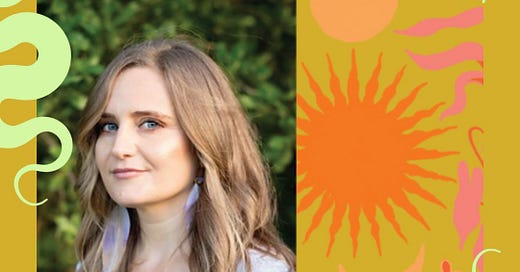



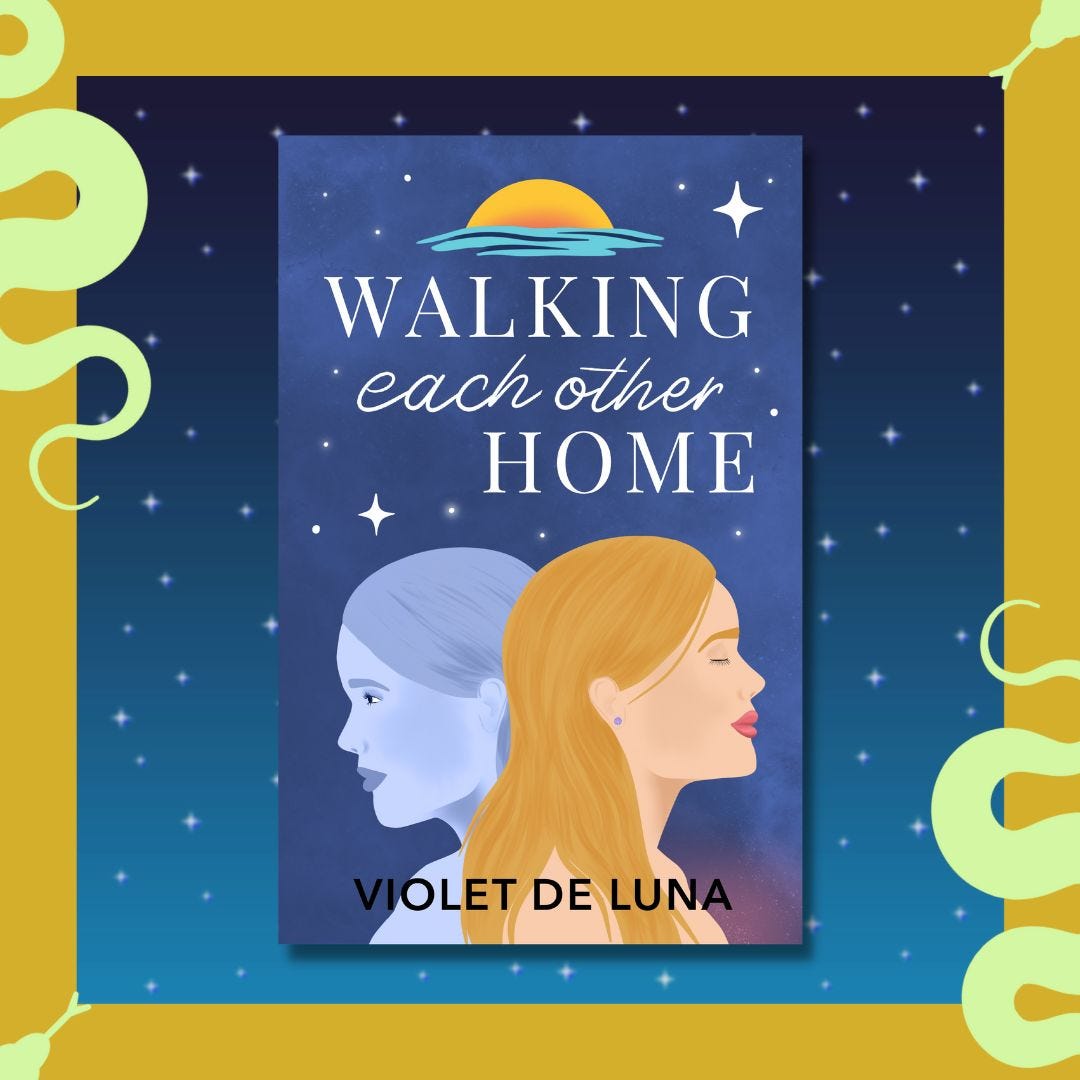
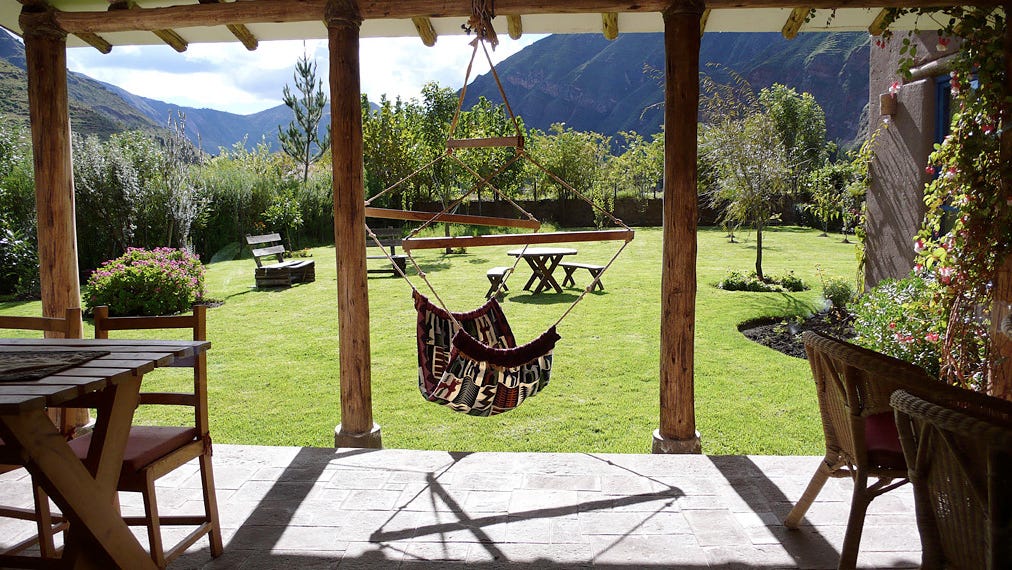
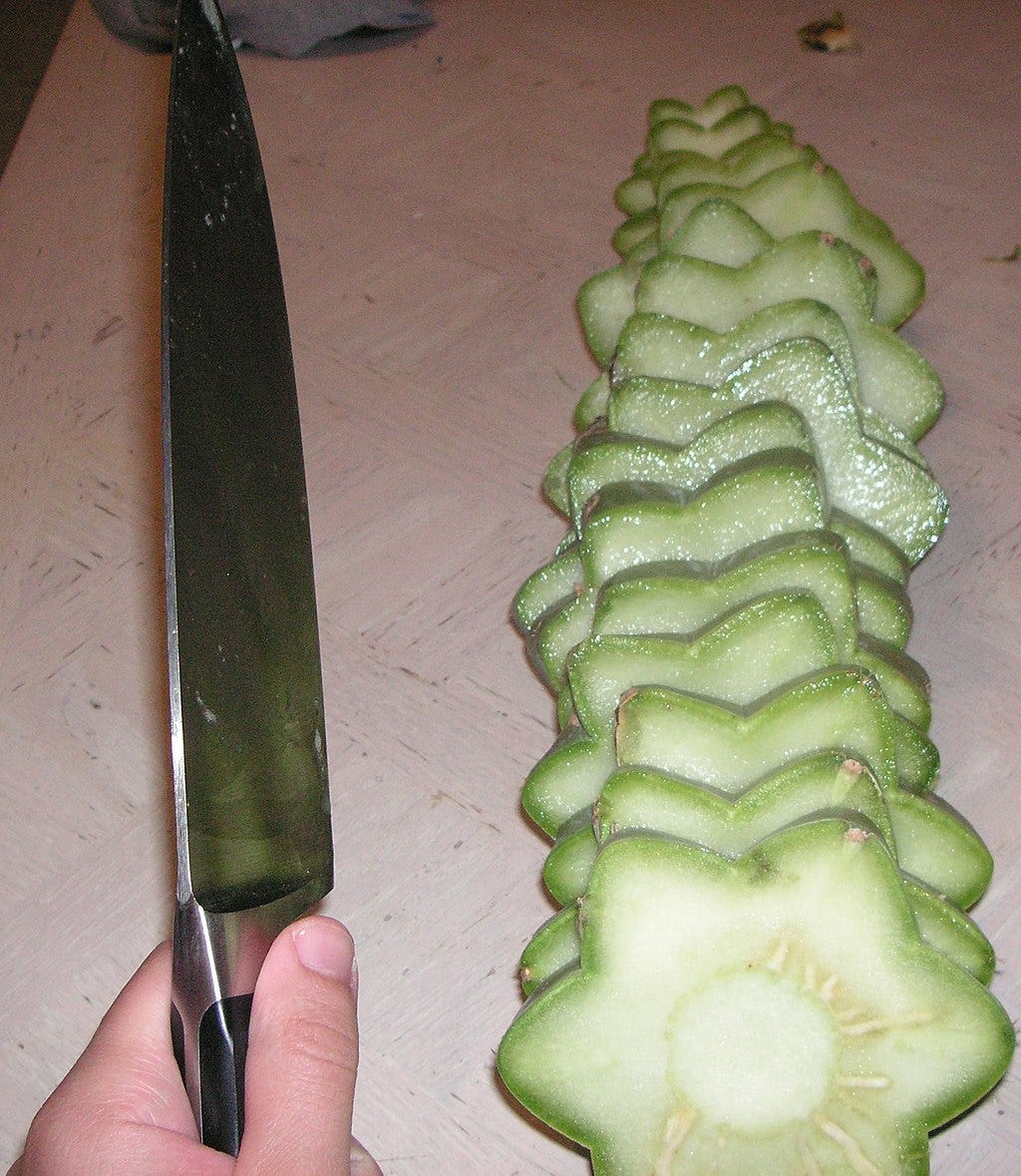
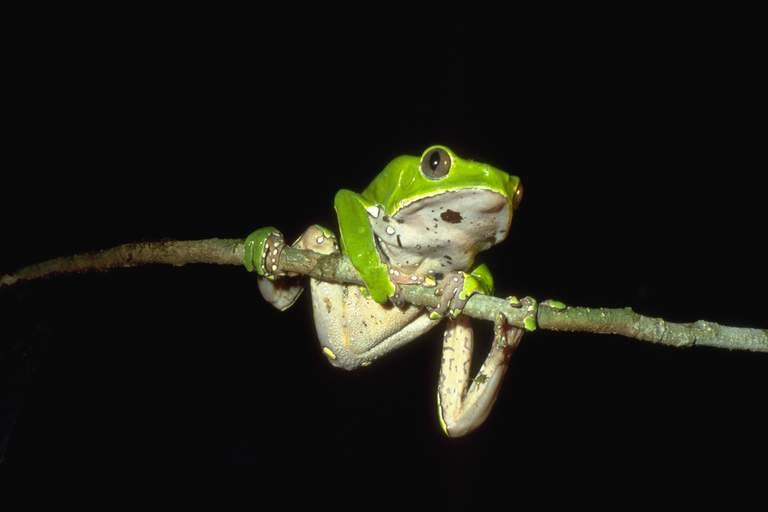

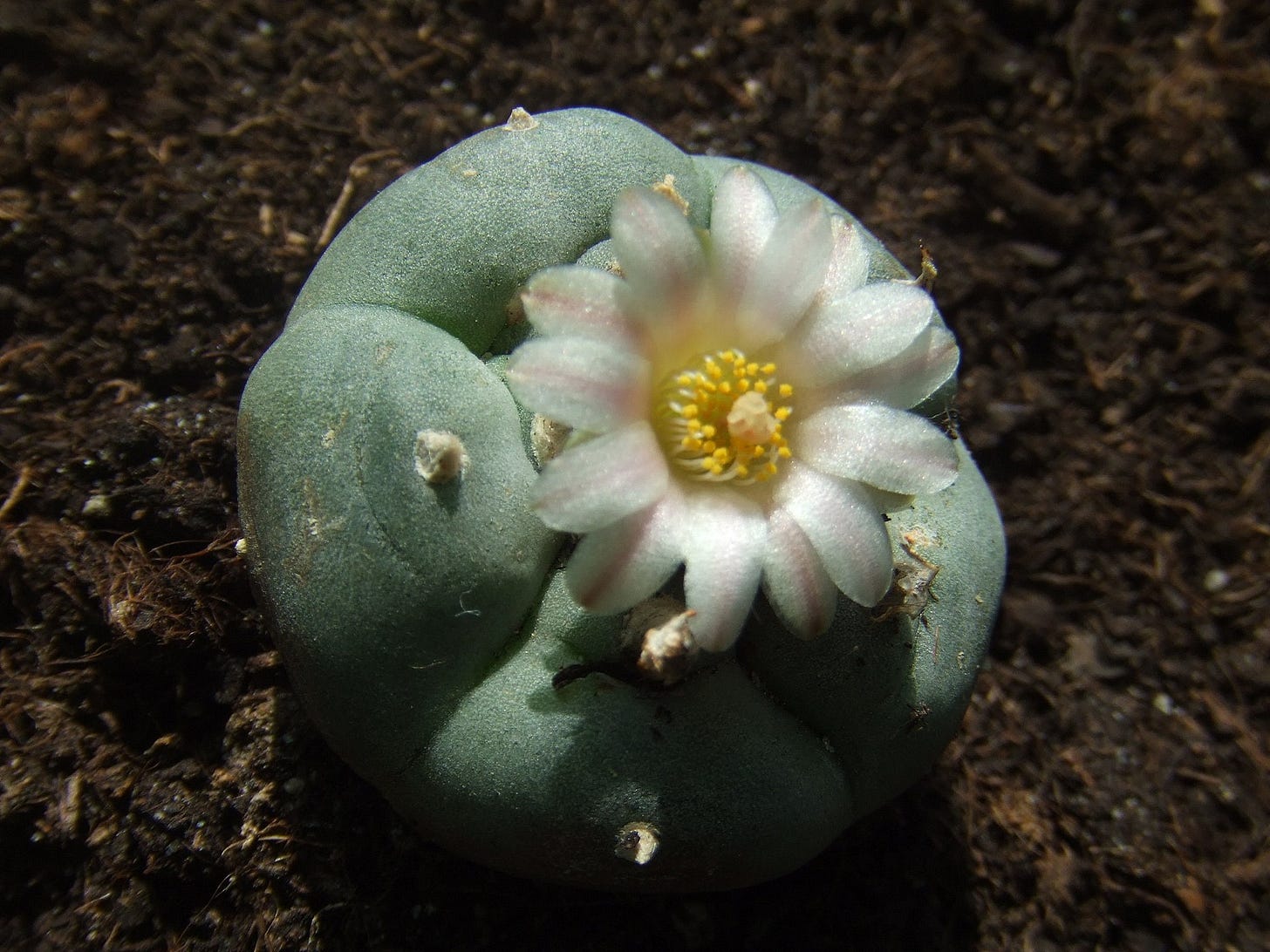
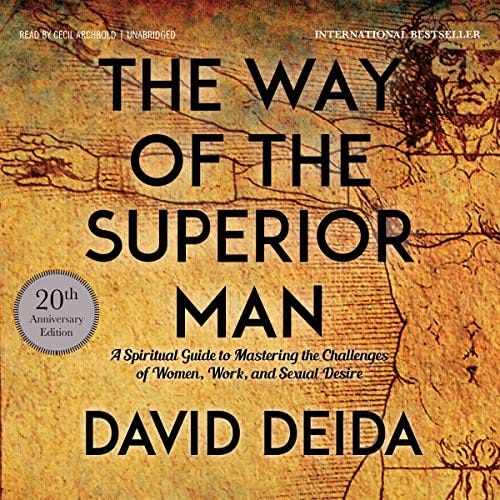




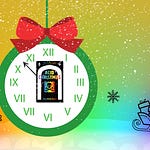
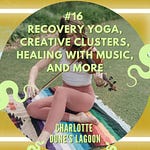



Share this post